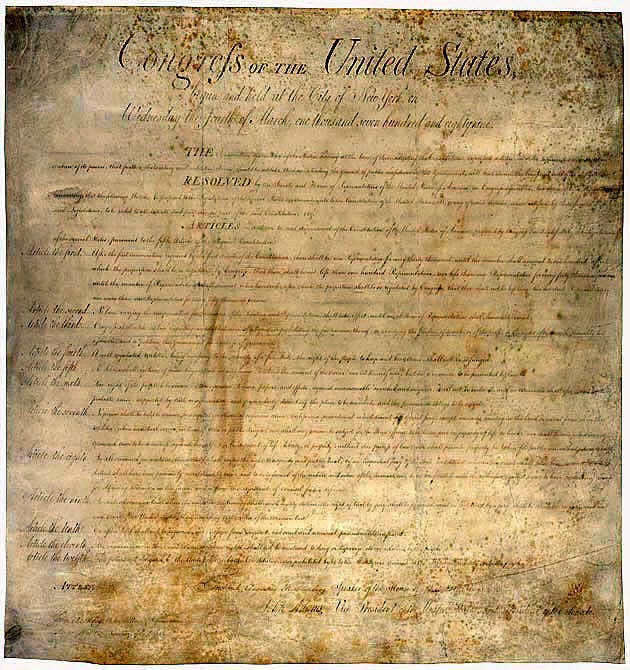This Day in Legal History: Ratification of the Bill of Rights by New Jersey
On November 20, 1789, New Jersey became the first state to ratify the Bill of Rights, a landmark moment in American constitutional history. Just months after the U.S. Constitution went into effect, debate over its lack of explicit protections for individual liberties sparked calls for amendments. Responding to this concern, James Madison introduced a series of proposed amendments in the First Congress in June 1789, aiming to ease Anti-Federalist fears and solidify support for the new federal government. Congress approved twelve amendments on September 25, 1789, and sent them to the states for ratification.
New Jersey acted swiftly, ratifying eleven of the twelve proposed amendments less than two months later. The state rejected the first proposed amendment, which concerned congressional representation, and accepted the rest, including protections for freedom of speech, religion, the press, the right to bear arms, and safeguards against unreasonable searches and seizures. New Jersey’s early endorsement gave momentum to the broader ratification effort, which required approval by three-fourths of the states.
By December 15, 1791, ten of the amendments had been ratified by the necessary eleven states and became known as the Bill of Rights. These provisions would become foundational to American legal doctrine, judicial interpretation, and civil liberties jurisprudence. New Jersey’s rapid ratification also signaled the willingness of smaller states to embrace a constitutional framework that better balanced federal power with individual protections.
The ratification process itself reflected the structural legal mechanism required to alter the Constitution—Article V mandates both congressional proposal and state approval. This episode demonstrates how early American legal institutions navigated public pressure and political compromise to create durable legal norms. The Bill of Rights remains central to constitutional interpretation today, frequently invoked in court cases involving speech, privacy, and due process.
A group of senior judges on the U.S. Court of Appeals for the Fifth Circuit has recently influenced several rulings on politically sensitive cases, softening the conservative tone of one of the nation’s most right-leaning appellate courts. These judges, many appointed decades ago by presidents like Jimmy Carter and Ronald Reagan, were part of three-judge panels that struck down or allowed challenges to laws involving religion in schools, drag shows on campus, and firearm signage. However, these decisions are now set for reconsideration by the court’s full active bench in January, as part of a growing trend of en banc rehearings.
The Fifth Circuit includes 17 active judges and seven senior judges. While senior judges can still hear cases and author opinions, their influence is ultimately limited because active judges control en banc reviews, which can overturn panel rulings. Most of these upcoming en banc cases saw dissents from Trump-appointed judges at the panel level. Some senior judges, like Edith Brown Clement, are conservative and remain highly active, while others like James Dennis and Patrick Higginbotham are known for their moderate or liberal views and are key voices in current and upcoming decisions.
Legal experts say senior judges’ experience and moderation often make them more willing to adhere to precedent rather than pursue ideological shifts. Their dissents and opinions can also help signal to the U.S. Supreme Court that a case warrants review. With an increase in ideologically charged cases on topics like immigration and free speech, the Fifth Circuit’s internal dynamics reflect a broader national tension between judicial restraint and a more activist, conservative legal agenda.
Full Fifth Circuit Overrides Moderate Senior Judges’ Rulings
The Equal Employment Opportunity Commission (EEOC) has asked a federal court to enforce a subpoena against the University of Pennsylvania as part of an ongoing investigation into alleged antisemitic harassment. The EEOC’s request was filed in the U.S. District Court for the Eastern District of Pennsylvania and stems from a charge initiated in December 2023 by Republican-appointed Chair Andrea Lucas. The agency is seeking documents and information identifying victims and witnesses to reported religious-based harassment affecting faculty and staff.
The investigation centers on claims that the university failed to adequately respond to internal complaints of antisemitism. The EEOC under Lucas—particularly during and after the first Trump administration—has prioritized enforcement actions related to religious discrimination, with higher education institutions facing increased scrutiny. Penn has not yet issued a public response regarding the subpoena or the broader investigation.
EEOC Seeks UPenn Information Disclosure in Antisemitism Probe
Cryptocurrency exchange Kraken announced that it has confidentially filed for an initial public offering (IPO) in the United States. The move positions Kraken among several digital asset firms seeking to go public amid renewed investor interest in the crypto sector. Other companies like Circle and Gemini have also made progress toward U.S. listings this year.
Kraken recently reported a $20 billion valuation in its latest fundraising round, marking a 33% increase over the past two months. While the company did not disclose specific details about the IPO structure or timeline, the filing indicates growing momentum for digital finance firms in public markets.
Crypto exchange Kraken confidentially files for US IPO | Reuters
The U.S. government has loaned Constellation Energy $1 billion to restart a nuclear reactor at the former Three Mile Island site in Pennsylvania. The project, now called the Crane Clean Energy Center, involves reviving an 835-megawatt reactor that was shut down in 2019. Constellation entered a partnership with Microsoft in 2024 to help offset the tech company’s energy use, especially for power-intensive data centers. The reactor’s restart reflects rising energy demand tied to emerging technologies like artificial intelligence.
The Department of Energy’s Loan Programs Office (LPO) issued the loan to help lower financing costs and encourage private investment. Officials emphasized that nuclear energy offers stable, carbon-free baseload power critical for both grid reliability and climate goals. While Constellation is financially strong enough to obtain private funding, the administration said public support signals a national commitment to clean and dependable energy infrastructure.
The plant still needs regulatory approvals, including from the Nuclear Regulatory Commission. Constellation has already begun hiring workers, inspecting systems, and ordering essential equipment. The company now expects the reactor to come online by 2027, a year ahead of the original timeline due to an accelerated grid connection review.
US loans Constellation $1 billion for Three Mile Island reactor reboot | Reuters













